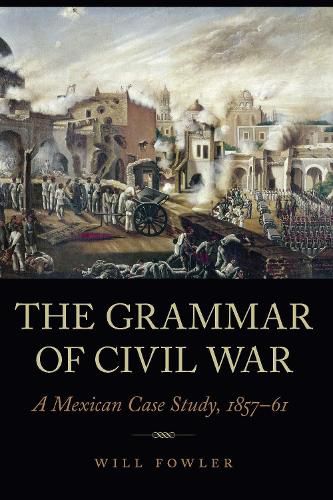Readings Newsletter
Become a Readings Member to make your shopping experience even easier.
Sign in or sign up for free!
You’re not far away from qualifying for FREE standard shipping within Australia
You’ve qualified for FREE standard shipping within Australia
The cart is loading…






Unlike wars between nations, wherein the population generally comes together to defend its borders and is united by a common national goal, civil wars tear countries apart, divide families, and turn neighbors against each other. Civil wars are a form of self-harm in which a country’s people seek redemption through self-destruction, punishing or severing those parts that are seen to have made the nation ill. And yet civil wars-with their characteristically appalling violence-remain chillingly common, defying the notion that they are somehow an aberration.
In The Grammar of Civil War Will Fowler examines the origin, process, and outcome of civil war. Using the Mexican Civil War of 1857-61 (or the War of the Reform, the political and military conflict that erupted between the competing liberal and conservative visions of Mexico’s future), Fowler seeks to understand how civil wars come about and, when they do, how they unfold and why. By outlining the grammatical principles that underpin a new framework for the study of civil war, Fowler stresses what is essential for one to take place and explains how, once it has erupted, it can be expected to develop and end, according to the syntax, morphology, and meanings that characterize and help understand the grammar of civil war generally.
$9.00 standard shipping within Australia
FREE standard shipping within Australia for orders over $100.00
Express & International shipping calculated at checkout
Unlike wars between nations, wherein the population generally comes together to defend its borders and is united by a common national goal, civil wars tear countries apart, divide families, and turn neighbors against each other. Civil wars are a form of self-harm in which a country’s people seek redemption through self-destruction, punishing or severing those parts that are seen to have made the nation ill. And yet civil wars-with their characteristically appalling violence-remain chillingly common, defying the notion that they are somehow an aberration.
In The Grammar of Civil War Will Fowler examines the origin, process, and outcome of civil war. Using the Mexican Civil War of 1857-61 (or the War of the Reform, the political and military conflict that erupted between the competing liberal and conservative visions of Mexico’s future), Fowler seeks to understand how civil wars come about and, when they do, how they unfold and why. By outlining the grammatical principles that underpin a new framework for the study of civil war, Fowler stresses what is essential for one to take place and explains how, once it has erupted, it can be expected to develop and end, according to the syntax, morphology, and meanings that characterize and help understand the grammar of civil war generally.